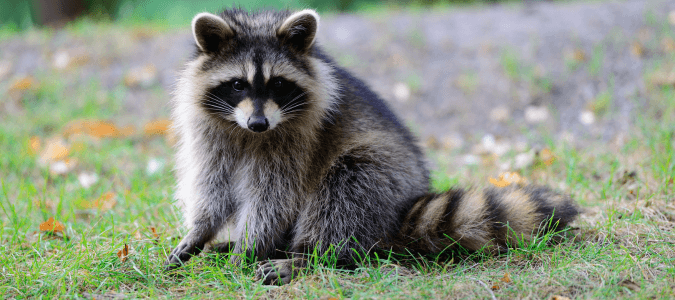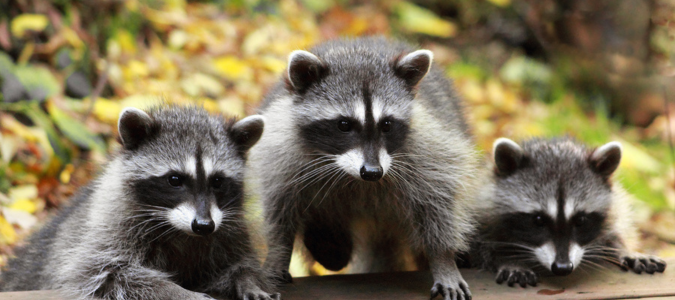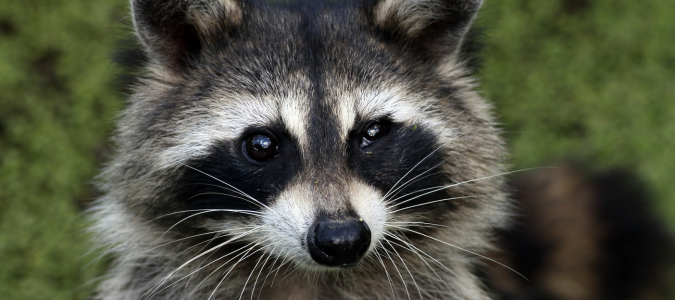What Sound Does a Raccoon Make?

What Sound Does a Raccoon Make?
As nocturnal animals, raccoons are the most active at night. This means that homeowners are likely to hear raccoons before they see them. It’s helpful to understand what sounds raccoons make so that you can intercept them as soon as you suspect they are on your property.
Raccoons make several different sounds depending on whether they feel threatened or happy. For example, threatened raccoons may hiss, growl, squeal or scream. Happy raccoons, on the other hand, make purring and cooing sounds.
Threatened Raccoon Sounds and What They Mean
Homeowners are more likely to hear the sounds of threatened raccoons, so it is important to learn how to distinguish them.
Raccoons hiss for similar reasons to cats. It indicates that they feel threatened, are becoming aggressive or are trying to ward off potential threats. A raccoon hiss sounds like the sound that a snake makes.
Next, raccoons have a low, guttural growl that they use as a warning. It is meant to fend off intruders or predators, but a growling raccoon can quickly become aggressive.
When raccoons are scared, they let off a high-pitched squeal. This typically happens when a raccoon is trapped or cornered and cannot escape. If a raccoon is distressed, the squeal will escalate to a piercing scream.
A raccoon scream is an extremely loud noise that can be startling to homeowners. Raccoons typically scream when they fight with another animal and feel extremely threatened. If you hear a raccoon hiss, growl, squeal or scream, stay away from it. The animal will perceive you as a threat and become aggressive, and raccoons can carry diseases like rabies.
Keep your pets away from the raccoon, as your pet can also contract diseases from the raccoon or get hurt in a fight. If you have more questions about how pets interact with pests, pest control specialists can answer if dogs keep mice away.
Happy Raccoon Sounds and What They Mean
Raccoons also make distinct sounds when they are happy. While it’s less likely for homeowners to hear these sounds, learning as much as possible about raccoon behavior is still a good idea. The more you know, the better you will spot the signs of a raccoon problem.
Like cats, raccoons purr when they feel safe, relaxed and happy. However, you must get very close to a raccoon to hear it purring, which is not recommended. Raccoons also make cooing sounds when they feel safe and interact with their young.
If you have pesky raccoons on your property, contact a wildlife control service to handle the problem. Raccoons may feel threatened around humans and can become aggressive, so it’s best to let the experts handle them.

What Month Are Raccoons Most Active?
Raccoons are active year-round but are the most active in the spring, summer and fall months. During winter, they spend more time laying low in their dens. While raccoons do not go into full hibernation, their activity levels are drastically reduced in the winter.
Once spring sets in and the weather warms up, raccoons amp up their activity levels, especially when searching for food. Springtime is also mating season for raccoons, and they are more active as they search for a mate.
In the summer, raccoons raise their new offspring, called kits. During this time they may travel outside their usual bounds to find food, and the young raccoons will begin exploring outside their dens.
As the fall months set in, raccoons focus on preparing for the winter. They use the lead-up time to fatten themselves up to prepare for harsh winter weather, so they spend most of their time foraging for food.
If you live in an area with mild winters, you may still see some raccoon activity through the winter months. However, even in these parts, raccoons are more active in the spring, summer and fall.
What Time of Day Are Raccoons Most Active?
Since they are nocturnal creatures, raccoons are most active at night. They typically begin foraging for food at dusk and retreat to their dens at dawn. However, there are a few reasons why you could spot raccoons during the day.
First, raccoons will venture out during the day if they need more food. This is especially true when raccoons are raising their kits in the summer. They will forage during the day if they do not have enough food to feed their young. They may also have to forage during the day because another animal species has disturbed their regular food source.
Another reason raccoons may emerge during the day is because they are sick or injured. Disoriented raccoons may get confused about the time of day. It’s important to stay away from raccoons that seem ill, as they can become aggressive.
Contact a wildlife control specialist if you spot a raccoon on your property.
How to Deter Raccoons From Your Property
You can do a few things to make your property less attractive to raccoons. First, remove potential food sources. Do not leave pet food outside overnight, and clean up any fallen fruit from fruit trees or seeds from bird feeders.
Next, make sure that your outdoor trash bins are firmly sealed. You can make them even more secure by using bungee cords to keep the lid closed. Additionally, if you have a compost pile, make sure that raccoons cannot access it.
You should also remove any potential raccoon shelters from your property, such as overgrown bushes, wood piles and debris. Keeping your yard tidy will eliminate potential raccoon nesting sites.
Installing motion detector lights in your backyard can also discourage raccoons from getting too comfortable on your property. Finally, seal up all potential entry points to deter them from entering your home or garage. For example, check for gaps in your roof, chimney and foundation that raccoons could use to get inside.
Another pest species that may like to nest in your garage is rats. Learn what to do about rats in your garage to make your home less friendly to pests.

Do Raccoons Come Back to the Same Place Every Night?
Raccoons do not go back to the same place every night. They are known for having multiple resting sites that they can rotate through. For example, they may have a den in your garage and your neighbor’s attic.
They also establish temporary resting spots in hollowed-out trees, abandoned structures and overgrown bushes. Raccoons often use these temporary resting spots during the day and return to their more permanent dens at night.
Raccoon behavior varies night by night. If a raccoon has created a den in your garage, they may return to it every night or only show up once every few nights. They are more likely to stay in one place while raising their kits. Regardless, you should contact a wildlife control expert if you have a raccoon on your property.
Another pest that may inhabit your home is mice. Many homeowners ask, “Can mice come through floor vents?”
Kick Raccoons Off Your Property With Professional Assistance
Learning about raccoon behavior, such as the sounds they make and the most active months, can help you identify a problem early. However, once you identify the problem, you should leave controlling them to the professionals.
Chem-Free Can Handle Your Wildlife Problems
Trying to deal with raccoons on your property can be dangerous and difficult. The wildlife control specialists at Chem-Free Organic Pest Control will be able to locate raccoon nesting grounds and remove these animals from your property. We will then recommend preventative measures to keep these creatures off your property in the future.
Need Help Managing Pests?
Chem-Free offers both effective, low-impact pest control options and preventative measures to help avoid future infestations. Contact us today for a free estimate!


